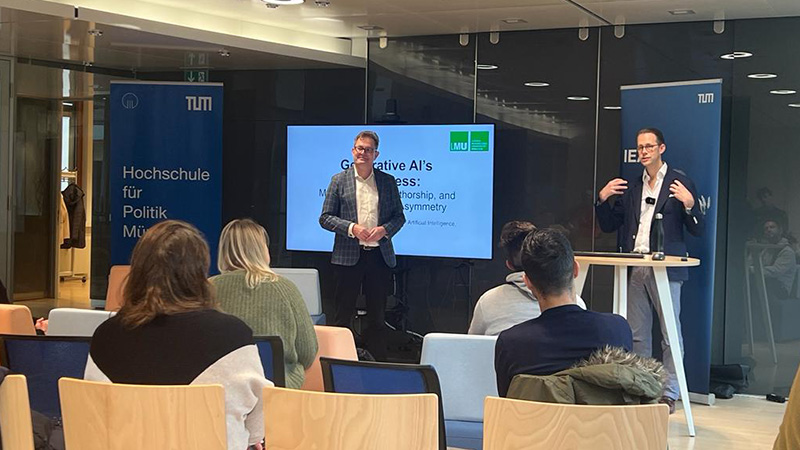Generative AI: Redefining Credit, Blame, Authorship, and Meaningfulness
On November 15th, 2023, we had the privilege of hosting a live discussion at the TUM Think Tank on the topic of ‘Generative AI’s Gappiness: Meaningfulness, Authorship, and the Credit-Blame Asymmetry.’ Our invited speaker was Sven Nyholm, Professor of Ethics of Artificial Intelligence at LMU.
Professor Nyholm, originating from Sweden, began his presentation by taking us back to the ABBA era. He illustrated his points with examples from the music industry, posing questions about what makes a song great, music production in a tech-driven world and how generative AI can influence the future of music creation and the associated royalties. The fundamental questions raised were who should claim authorship and be credited as the composer in the digital era.
Additional examples from the recent Hollywood screenwriters’ strike and a photography competition (where an AI-generated image won first prize) underscored the reasoning for Professor Nyholm’s recent focus of his research on Generative AI’s “Gappiness”.
His talk explored the issue of who deserves credit, both in terms of being recognized and paid as an author. This discussion extended to scenarios where Large Language Models (LLMs) produce outcomes based on other people’s work. Professor Nyholm also delved into the question of who is to blame when people rely on false information generated by poorly trained LLMs. Furthermore, he examined the appropriateness of LLMs generating texts for solemn occasions.
“The authors can get credit or blame for what they have produced. But what if the output is produced very much with the help of or by generative AI technology? Who is the author? Who gets credit and who is to blame? How should that affect how we think about authorship and credit?”
He pointed out that technology does not understand meaning, inherently rendering it incomplete or “gappy”. This sense of incompleteness, this feeling that something crucial is missing, despite the beautiful and sometimes informative sentences, piques his interest.
The “gappiness” is fascinating, not just in Shakespeare, but I would argue also in generative AI.
Professor Nyholm explored various schools of thought for how we can broaden, modify, or introduce new concepts to terms such as credit, blame, authorship, and meaningfulness. For instance, Nyholm raised the question of what defines an author and wondered whether a computer program can be considered as one. He pointed out that typically, to receive credit for something, individuals need to demonstrate talent and effort. However, if people heavily rely on generative AI, it might mean they invest less effort and display less talent. This challenges the conventional criteria for authorship.
In another example of a gap, what happens when you train an LLM with someone’s own work to produce outcomes according to their own style? Who can take the credit? An example mentioned was the “last” Beatles song, “Now and Then“, which was recently released with the use of AI technology tools.
Professor Nyholm concluded his presentation by addressing the distinction between someone being artificially intelligent and genuinely intelligent. For example, if an LLM is trained on an individual’s past work to produce outputs, it might appear from the outside that the person is still an intelligent and capable author, but this is actually not a measure of their current intelligence.
These technologies do not understand what they say, so they cannot be authors. We might not truly get credit for the outputs we use these technologies for; there are many gaps.
He concluded his presentation by emphasizing that we live in a world that uses generative AI, and we either maybe have to expand our ideas about credit, blame, authorship, and meaningfulness to make them also fit our new situation, or we might need new concepts or ways of thinking about these terms.
We thank Professor Nyholm for his insightful talk and for engaging with the IEAI community on this vital and highly relevant issue. We would additionally like to thank our event registrants for their participation. The recording of the event is available here.

